On 17 July 2020, the European Council will examine the Multiannual Financial Framework (MFF) for the period 2021-2027. On this occasion, EU leaders will discuss both internal and external aspects of the budget allocated to migration and asylum.
As it stands, the European Commission proposes a total of EUR 40.62 billion budgetary envelope for migration and asylum programmes, divided into EUR 31.12 billion for the internal dimension and approximately EUR 10 billion for the external dimension. This is a 441% monetary value increase compared to its 2014 proposal for the 2014-2020 budget and a 78% increase compared to the 2015 budgetary review for the same budget.
A dressed-up reality
Is this good news to ensure the well-being of thousands of migrants and refugees currently living on the streets or stuck in overcrowded reception centres in EU member states? Actually, this increase is mainly directed towards strengthening the security approach: in the current proposal, approximately 75% of the EU’s migration and asylum budget would be allocated to returns, border management and the externalisation of controls. This takes place at the detriment of asylum and programmes of integration, within member states, which are left with 25% of the overall budget.
The 2014 budget did not include an external dimension. This variable was only introduced in 2015 with the creation of the EU Trust Fund for Africa (EUR 4.7 billion) and a financial envelope to support the implementation of the much-decried EU-Turkey statement of March 2016 (EUR 6 billion). Both budgetary lines follow the dangerous logic of conditionality between migration and development: development aid is linked to the acceptance, by the relevant third countries, of migration controls or other migration-related tasks. Furthermore, at least 10% of the budget foreseen for the Neighbourhood, Development and International Cooperation Instrument (NDICI) is earmarked for migration management projects in origin and transit countries. These projects rarely have anything to do with development activities.
Beyond the numbers are human rights violations
The worrying increase of the security dimension of the EU’s budget corresponds, in the field, to a rise in violations of fundamental rights. For instance, the more funds are allocated to the “Libyan Coast Guard”, the more pushbacks (refoulements) can be observed on the Central Mediterranean route. Since 2014, the number of pushbacks to Libya amounted to a total of 62,474 people; this represents over 60,000 people who tried to escape well-documented violence in Libya and put their lives at risk, but were brought back to undignified detention facilities indirectly supported by the EU.
In Turkey, another long-term EU partner when it comes to outsourcing migration controls, the authorities do not hesitate to play with the lives of migrants and refugees, opening and closing borders, to negotiate the disbursement of funds, as the recent example at the Greek-Turkish border attests.
An opaque use of the budget
“EuroMed Rights is concerned by the opacity of fund allocations under the current budget and calls on the European Union to ensure accountability and transparency on the use of the funds and the human impact, particularly when dealing with countries where corruption is systematic and which regularly violate the rights of migrants, refugees and the rights of their citizens,” stated Wadih Al-Asmar, President of EuroMed Rights.
“As EU leaders convene in Brussels to discuss the next Multiannual Financial Framework, EuroMed Rights demands that a more humane and rights-based approach be taken towards migrants and refugees so that the calls for empathy and decisive action of European Commission President von der Leyen do not remain meaningless.”
Cover photo: Sara Prestianni

